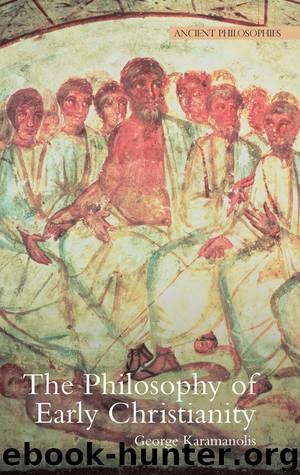The Philosophy of Early Christianity by Karamanolis George E.;

Author:Karamanolis, George E.;
Language: eng
Format: epub
ISBN: 1779056
Publisher: Routledge
Irenaeus, Tertullian and Clement
Irenaeus pays considerable attention to the issue of free will in his anti-Gnostic critique in Adversus Haereses. I have said earlier that Valentinus and his partisans limited free will to only one class of people, but I need to be more precise. They apparently distinguished between men made in the image (eikōn) of God, men made in God’s likeness (homoiōsin), and those who are neither (Adv. Haer. V.6.1). Accordingly they distinguished three categories of men: the pneumatic, perfect men; the psychic, imperfect men; and the earthly, who are, in their view, only partly men. And they argued that salvation is certain only for the first category (I.6.1–3). The third category of people are, in their view, by nature prone to badness and do not have any hope of salvation no matter what they do, while the people of the second category are susceptible to both good and bad decisions, and salvation is up to them. They are the only ones who have freedom of choice (autexousion), but this is a disadvantage against the people of the first category, whose actions are determined by God to be good.25
Valentinus’ doctrine of predestination is criticized by Irenaeus as inconsistent and unreasonable. First, Irenaeus argues, it is unclear on what grounds God could have divided people into classes privileging some over the others, and how he could have justified this. Second, such a view, Irenaeus claims, abolishes the value and disvalue of goodness and vice, respectively, as well as the justification for any judgement for either praise or blame (Adv. Haer. IV.37.2). Irenaeus suggests instead that God created all men equal and as a result all men are endowed with the same nature, that is, all are made in the image and the likeness of God. This in turn means that all are free to choose (liber in arbitrio etsuae potestatis) and all can be saved.26 Irenaeus summarizes his thesis thus:
Man is endowed with reason and in that respect he is similar to God, being made by his creator so that he is free in judging and in deciding [eleutheros ten gnōmēnkai autexousios]. The cause is placed on man, such that it depends on man alone whether he will become corn or pollen.
(Adv. Haer. IV.4.3)
Download
This site does not store any files on its server. We only index and link to content provided by other sites. Please contact the content providers to delete copyright contents if any and email us, we'll remove relevant links or contents immediately.
| Africa | Americas |
| Arctic & Antarctica | Asia |
| Australia & Oceania | Europe |
| Middle East | Russia |
| United States | World |
| Ancient Civilizations | Military |
| Historical Study & Educational Resources |
The Daily Stoic by Holiday Ryan & Hanselman Stephen(3153)
The Fate of Rome: Climate, Disease, and the End of an Empire (The Princeton History of the Ancient World) by Kyle Harper(2927)
People of the Earth: An Introduction to World Prehistory by Dr. Brian Fagan & Nadia Durrani(2644)
Ancient Worlds by Michael Scott(2537)
Babylon's Ark by Lawrence Anthony(2463)
Foreign Devils on the Silk Road: The Search for the Lost Treasures of Central Asia by Peter Hopkirk(2396)
The Daily Stoic by Ryan Holiday & Stephen Hanselman(2391)
India's Ancient Past by R.S. Sharma(2334)
MOSES THE EGYPTIAN by Jan Assmann(2310)
The Complete Dead Sea Scrolls in English (7th Edition) (Penguin Classics) by Geza Vermes(2173)
Lost Technologies of Ancient Egypt by Christopher Dunn(2146)
The Earth Chronicles Handbook by Zecharia Sitchin(2123)
24 Hours in Ancient Rome by Philip Matyszak(1997)
Alexander the Great by Philip Freeman(1985)
Aztec by Gary Jennings(1901)
The Nine Waves of Creation by Carl Johan Calleman(1811)
Curse Tablets and Binding Spells from the Ancient World by Gager John G.;(1791)
Before Atlantis by Frank Joseph(1758)
Earthmare: The Lost Book of Wars by Cergat(1736)
